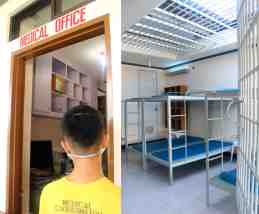
Manila – Tuberculosis patients at Quezon City Jail in the Philippines will now have access to proper treatment and monitoring of their condition at a newly renovated and expanded facility, the International Committee of the Red Cross said on Monday.
The ICRC supported the renovation of the facility, which opened on Monday. It also facilitated the implementation of the National TB Control program in the jail, the second largest of those administered by the Bureau of Jail Management and Penology (BJMP), with a population of about 3,000 inmates.
The infirmary, which is 211 square metres in area, can accommodate up to 60 patients.
“All inmates affected with TB used to be held in a small isolation room, which created a greater risk of detainees with multi-drug-resistant TB infecting others. Overcrowded detention facilities being an effective breeding ground for the spread of TB, the ICRC recognized the necessity of working with the jail authorities to improve infection control,” said Dr Gegham Petrosyan, the ICRC’s health coordinator in the Philippines.
The new facility has five treatment rooms, which enables patients to be separated by type of TB. It also has a medical office for the staff and a small room where sputum is collected, reducing the risk of infection.
Treating multi-drug-resistant TB, which does not respond to two of the most efficient antibiotics, is more complicated than treating ordinary strains of TB, which can generally be cured in six or seven months.
“The jail will serve as an example of best practice in managing TB in Philippine detention facilities,” said Petrosyan. “The relationship between the ICRC and the BJMP is constructive and open: the BJMP recognizes that the ICRC can bring added value, while the ICRC sees that the BJMP is open to discussing ways of bringing about positive change for all inmates.”
The ICRC has been visiting Philippine jails for more than 50 years. Among the people it visits are those detained in connection with internal armed conflicts and other situations of violence. The objective of these visits is to monitor the conditions of detention and the treatment of detainees.
In 2007, the ICRC launched the Call for Action initiative with a view to addressing overcrowding in jails, its causes and its consequences for the health and living conditions of detainees. The ICRC supports the program for managing TB in prisons, which is implemented jointly by the BJMP and the Bureau of Corrections within the frame of the National TB Control program administered by the Department of Health.

